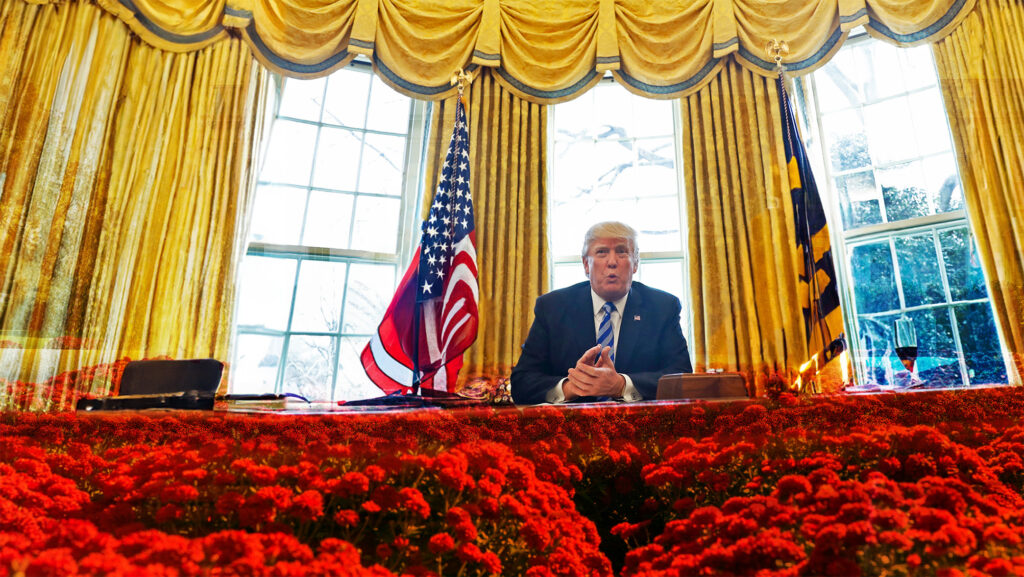The Survival of Democracy Depends on Our Willingness to Fight

Trump wants to be a dictator, and not just for one day. Since he stepped back into the Oval Office, nearly every day brings new examples of Trump’s commitment to authoritarianism and obsession with election denialism and subversion. From his numerous unconstitutional executive orders, through which he attempts to rule by fiat, to his public threats against political rivals and opponents, Trump has no shame in exposing his true intentions.
Most importantly, Trump has eagerly aligned himself with despots, their regimes and their values. Just look at his desire to accept a $400 million plane from the Qatari government. He’s partially motivated to turn it into Air Force One because it comes from a despot, not despite that fact. He wants to be part of their club. For Trump, the reality that accepting it would violate the Constitution is a feature, not a flaw — it brings him emotionally closer to a world where, like the royal families of the Gulf States, he can act with impunity.
This situation would be less dire if the Republican Party had not transformed into a movement that views authoritarianism as a virtue and democracy as a weakness. Curtis Yarvin, once a fringe right-wing zealot who advocates replacing U.S. democracy with a monarchy, is now seen as an influential thinker within the GOP. Donald Trump’s official store even sells merchandise for a 2028 campaign — knowing full well that if he were to seek reelection, it would be a direct violation of the U.S. Constitution’s limit of two presidential terms.
Even as they create a mythology of Trump as a man of historical destiny, his MAGA adherents remain fixated on the 2020 election because it provides glaring evidence that Trump is not invincible. It also serves as a roadmap to potentially wipe out his congressional majorities in 2026, exposing him as a fundamentally unpopular politician.
With insufficient scrutiny, the formal structures of the Republican Party — the Republican National Committee and its state affiliates — have become full-time, year-round voter suppression and election subversion machines. Bolstered by a president who cares about nothing else and a network of right-wing organizations, Republicans have nearly limitless funds to target likely Democratic voters with new barriers to voter registration and ballot counting.
Novel voter suppression techniques are the most valuable currency in the MAGA-dominated GOP, and nationwide, at every level of government, Republican officials are playing their part. Republican legislatures pass new anti-voting laws designed to disproportionately affect voters likely to oppose them. Republican election officials devise creative methods to administer elections in ways that disadvantage Democrats. Election deniers file baseless challenges and flood local election offices with conspiracy theories and hate.
Behind all these efforts is an army of Republican lawyers with unlimited budgets, advancing legal theories meant to undermine free and fair elections. In recent years, Republicans have promoted theories that would strip state courts of the power to invalidate anti-voting laws passed by GOP legislatures, empower election-denying local officials to refuse to certify election results and gut the remaining provisions of the Voting Rights Act.
While these efforts have mostly been defeated so far, those of us in the pro-democracy legal community know we must win almost every case, while the other side only needs to win a few. Most recently, these were the stakes in North Carolina, where Republicans tried to steal a state supreme court seat. In lawsuit after lawsuit, the GOP sought to disenfranchise tens of thousands of voters by applying new rules and legal standards after the election was over.
Although they ultimately failed, the risk remains. At her swearing-in, the victorious candidate, Allison Riggs, lamented, “It doesn’t have to be this way. Voters should not have to fight tooth and nail to have their lawful votes counted.”
Justice Riggs is right. We should not have to fight for democracy. But the reality is that we must.
The future of our democracy does not rest within the Republican Party. It will not reform itself as long as Trump is in charge. Meanwhile, the GOP’s assaults on democracy will continue to escalate. It will spare no expense, adhere to no norm and will not feel bound by any legal principle standing in its way.
But what about us? How committed are we to fighting for democracy today and securing free and fair elections in 2026? Rather than searching for signs of decency among Republicans, we must honestly assess our willingness to fight.
In the past, this was a matter of priorities, messaging and resources. Now, it requires all those things, plus courage and determination. At a time when Trump targets law firms, political opponents and nonprofit organizations, courage seems in short supply — but it is more crucial now than ever.
We must also possess the determination to fight as hard and as long as our Republican adversaries. They fought for six months for a single state supreme court seat, ignoring public criticism and setbacks along the way. Republicans are willing to advance a series of fringe, long-shot cases in the hopes of securing a single victory.
We will not win the battle for democracy if those in the pro-democracy movement prize caution over taking risks. We cannot permit ourselves to be deterred by the inevitable defeats and public criticism that are inevitable along the long path of restoring democracy. Now is the time for fearless leadership and bold action.
The fight for democracy is the fight of our generation. It may not be the battle we wanted, but it is the one we face. The state of our democracy and the future of our country depends on our willingness to take risks, ignore the naysayers, weather setbacks and fight fiercely for democracy and free and fair elections.
For ways to get involved in the opposition and fight back, check out Marc’s list of 10 things you can do right now to protect free and fair elections.